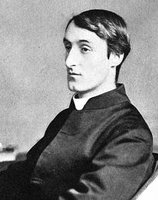 Gerard Manley Hopkins born 28 July 1844 (d. 1889)
Gerard Manley Hopkins born 28 July 1844 (d. 1889)Essex-born Gerard Manley Hopkins was a Victorian poet and Jesuit priest.
Although a brilliant scholar, Hopkins failed his final theology exam which limited his career in the clergy, although ordained. Short (5ft 2in.), gloomy and odd, he was not an effective teacher either, although he was a professor of Greek literature at University College, Dublin; but he was a lifelong poet of considerable brilliance (if a gloomy kind of brilliance) and influence. He was particularly influential in creating a new form of rhythm by combining different traditions of poetry into something completely new, which effectively pre-dated the free verse of 20th century poetry.
Little known during his lifetime, he had an enthusiastic audience of motley fellow poets but it was his university friend and supporter Robert Bridges who brought Gerard Manley Hopkins work to prominence when he, by then Poet Laureate, published the first collected edition of his late friend's work.
Plagued by ill health for much of his life, Hopkins died of typhoid fever aged only 45, and is buried in Dublin.
Although it is unlikely that the sexually-repressed Catholic priest, Hopkins would have considered himself to be homosexual, his poetry reveals that he considered male beauty to be one of the most splendid witnesses of the divine; his diaries reveal something of a tortured obsession with actual male beauty.